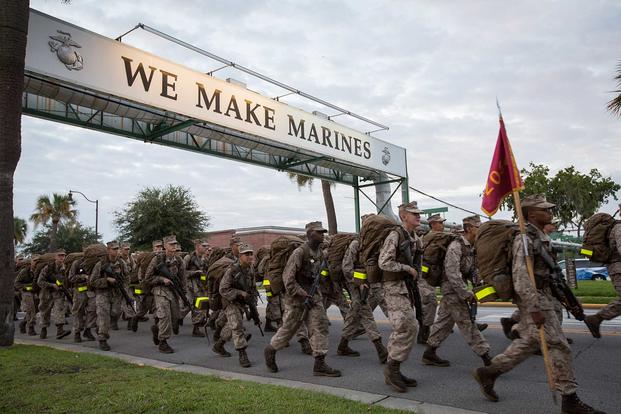Military leaders are racing to implement new policies to prevent the spread of coronavirus at boot camp, on ships and other hard-hit areas after several asymptomatic people have tested positive.
A pair of Marine recruits in South Carolina who got coronavirus screenings before boot camp and showed no symptoms for the illness started training only to later test positive for COVID-19, said Capt. Bryan McDonnell, a spokesman at Marine Corps Recruit Depot Parris Island.
The illness, which has left dozens of troops hospitalized and led to New Jersey Army National Guard Capt. Douglas Linn Hickok's death, is now a global pandemic.
"Through their contact investigation, we put out tests whether they were symptomatic or not, and that's where we had that increase in cases when we got the tests back," McDonnell said.
Related: 'Sailors Do Not Need to Die': Carrier Captain Pleads for Help as Virus Cases Surge
There were more than 20 confirmed cases at Parris Island as of Monday afternoon, though that number is expected to jump as more test results come in. Now, three military services are restricting the flow of new recruits to training camps as they put in place new quarantine measures for incoming personnel.
A commanding officer on an aircraft carrier is also warning top Navy leaders that COVID-19 tests can't be relied on to stop the spread of the virus on a ship. Navy Capt. Brett Crozier, commanding officer of the carrier Theodore Roosevelt, said seven sailors tested negative for COVID-19 as soon as a day before coming down with the illness.
"The COVID-19 tests cannot prove a Sailor does not have the illness; it can only prove that a Sailor does," Crozier wrote in a candid letter to Navy leadership, pleading for help in slowing the virus spread on that carrier. There could be as many as 200 COVID-19 cases onboard, the San Francisco Chronicle reported.
Much is still unknown about COVID-19, the Centers for Disease Control and Prevention website states. But experts have for weeks warned that it's possible people with no coronavirus symptoms could spread the illness to others.
Now, that appears to be happening within the military ranks.
Crozier pleaded for Navy leaders to move all 4,000 crew members off his carrier to prevent further spread of COVID-19.
"Based on data since [the carrier's] first case, approximately 21% of the Sailors that tested negative and are currently moving into group-restricted movement ashore are currently infected, and will develop symptoms over the next several days," he wrote, "and will proceed to infect the remainder of their shore-based restricted group."
The two Marine recruits who were asymptomatic but tested positive for COVID-19 were from the Atlanta area, McDonnell said. They had gotten temperature checks and completed CDC-recommended questionnaires at their recruiting station and the military entrance processing station before getting to Parris Island.
Once at the recruit depot, they did those things again. They showed no indication of having coronavirus.
But as cases at the depot spread, that base -- along with the Air Force and Navy -- has temporarily halted the shipment of incoming recruits.
At Parris Island and Great Lakes, Illinois, where the Navy trains recruits and at least one has tested positive for COVID-19, new trainees will now have to shelter in place at the bases before they can begin boot camp. McDonnell said the Marine recruits will undergo medical checks during that time.
Those heading to Air Force boot camp will also be quarantined for 14 days upon arrival. The services have adopted various social distancing methods at boot camp, too, including spreading trainees out in squad bays and dining facilities.
The Marine Corps' West Coast recruit training depot in San Diego, which has not had any COVID-19 cases among recruits or drill instructors, will not follow those same measures, said Capt. Martin Harris, a spokesman for that base. Recruits heading to boot camp there will still undergo the three temperature checks and questionnaires before starting training.
The Army is doing the same.
Crozier, whose sailors from the carrier Teddy Roosevelt have been observing group quarantine in gymnasiums on Guam, isn't convinced that will stop the spread of this virus in group settings, though. His recent letter raises questions about whether the services' new boot camp efforts will be effective.
"Although marginally better than a warship, group quarantine sites are not a solution and are not in accordance with current guidance," Crozier wrote. "In order to stop the spread of the virus, the CDC and the Navy and Marine Corps Public Health Center both recommend individual quarantine."
-- Oriana Pawlyk and Matthew Cox contributed to this report.
-- Gina Harkins can be reached at gina.harkins@military.com. Follow her on Twitter @ginaaharkins.
Read More: 'We Are Putting Lives in Danger': Recruiters Urge Boot Camp Closures Amid Pandemic












